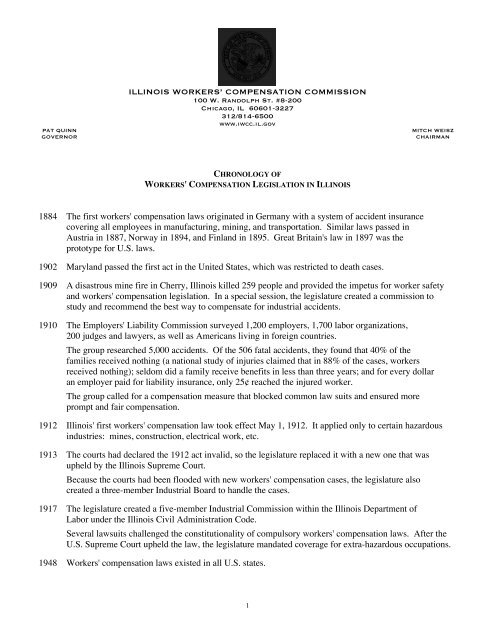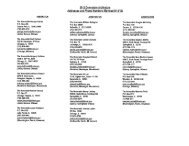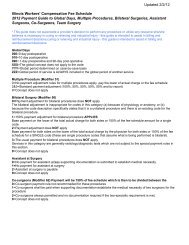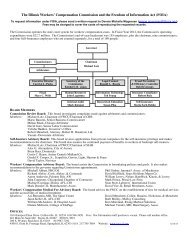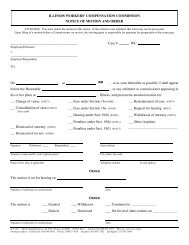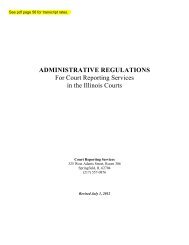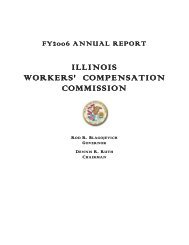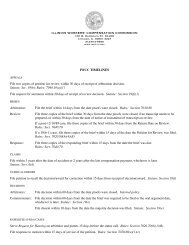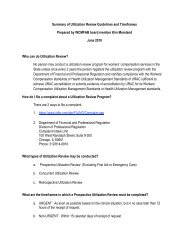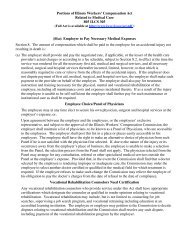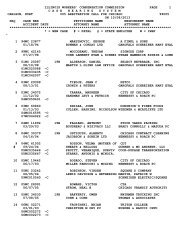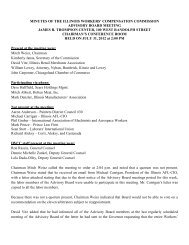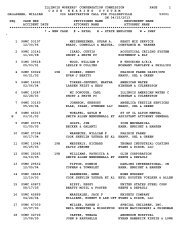ILLINOIS WORKERS' COMPENSATION COMMISSION 1884 ... - IWCC
ILLINOIS WORKERS' COMPENSATION COMMISSION 1884 ... - IWCC
ILLINOIS WORKERS' COMPENSATION COMMISSION 1884 ... - IWCC
Create successful ePaper yourself
Turn your PDF publications into a flip-book with our unique Google optimized e-Paper software.
PAT QUINN<br />
GOVERNOR<br />
<strong>ILLINOIS</strong> WORKERS’ <strong>COMPENSATION</strong> <strong>COMMISSION</strong><br />
100 W. Randolph St. #8-200<br />
Chicago, IL 60601-3227<br />
312/814-6500<br />
www.iwcc.il.gov<br />
MITCH WEISZ<br />
CHAIRMAN<br />
CHRONOLOGY OF<br />
<strong>WORKERS'</strong> <strong>COMPENSATION</strong> LEGISLATION IN <strong>ILLINOIS</strong><br />
<strong>1884</strong> The first workers' compensation laws originated in Germany with a system of accident insurance<br />
covering all employees in manufacturing, mining, and transportation. Similar laws passed in<br />
Austria in 1887, Norway in 1894, and Finland in 1895. Great Britain's law in 1897 was the<br />
prototype for U.S. laws.<br />
1902 Maryland passed the first act in the United States, which was restricted to death cases.<br />
1909 A disastrous mine fire in Cherry, Illinois killed 259 people and provided the impetus for worker safety<br />
and workers' compensation legislation. In a special session, the legislature created a commission to<br />
study and recommend the best way to compensate for industrial accidents.<br />
1910 The Employers' Liability Commission surveyed 1,200 employers, 1,700 labor organizations,<br />
200 judges and lawyers, as well as Americans living in foreign countries.<br />
The group researched 5,000 accidents. Of the 506 fatal accidents, they found that 40% of the<br />
families received nothing (a national study of injuries claimed that in 88% of the cases, workers<br />
received nothing); seldom did a family receive benefits in less than three years; and for every dollar<br />
an employer paid for liability insurance, only 25¢ reached the injured worker.<br />
The group called for a compensation measure that blocked common law suits and ensured more<br />
prompt and fair compensation.<br />
1912 Illinois' first workers' compensation law took effect May 1, 1912. It applied only to certain hazardous<br />
industries: mines, construction, electrical work, etc.<br />
1913 The courts had declared the 1912 act invalid, so the legislature replaced it with a new one that was<br />
upheld by the Illinois Supreme Court.<br />
Because the courts had been flooded with new workers' compensation cases, the legislature also<br />
created a three-member Industrial Board to handle the cases.<br />
1917 The legislature created a five-member Industrial Commission within the Illinois Department of<br />
Labor under the Illinois Civil Administration Code.<br />
Several lawsuits challenged the constitutionality of compulsory workers' compensation laws. After the<br />
U.S. Supreme Court upheld the law, the legislature mandated coverage for extra-hazardous occupations.<br />
1948 Workers' compensation laws existed in all U.S. states.<br />
1
1957 The Commission separated from the Department of Labor and became a self-standing agency.<br />
The Occupational Diseases Act became mandatory.<br />
1970 Congress passed the Occupational Safety and Health Act (OSHA). It also created a national<br />
commission to study workers' compensation systems across the country and recommend<br />
improvements.<br />
At the time, workers' compensation benefits were widely considered to be inadequate. In more than<br />
half the states, the maximum benefit for a temporary total disability was below the poverty level for<br />
a family of four.<br />
Later, the group issued 84 recommendations concerning the coverage of employees and diseases,<br />
income protection, medical care, worker safety, and program administration.<br />
1975 Illinois responded to the national commission's recommendations by enacting the following:<br />
1. The temporary total disability benefit was set at 66 2/3% of the employee's average weekly wage<br />
(AWW), up to 100% of the statewide average weekly wage (SAWW). The minimum benefit<br />
increased from $31.50 per week for a single person to $100.90 per week or the employee's<br />
AWW, whichever is less. The maximum benefit increased from $100.90 per week for a single<br />
person to $205 per week or 50% of the employee's AWW, whichever is more. The limit on the<br />
total number of weeks that may be awarded was removed.<br />
2. The maximum permanent partial disability benefit was set at 66 2/3% of the employee's AWW,<br />
up to 100% of the SAWW. The minimum benefit increased from $31.50 per week for a single<br />
person to $80.90 per week or the employee's AWW, whichever is less. The maximum benefit<br />
increased from $80.90 per week for a single person to $205 per week or 50% of the employee's<br />
AWW, whichever is more.<br />
3. The maximum death benefit was set at 66 2/3% of the employee's AWW, up to 100% of the<br />
SAWW, for the lifetime of the surviving spouse. The law also provided that the death benefit<br />
should never be less than 50% of the employee's AWW.<br />
4. The statute of limitations was changed to require filing a case within three years of the accident<br />
or two years from the date of last payment. Before 1975, employees had to file a claim within<br />
one year of the date of the accident or the date of last payment.<br />
5. In recognition of the time-value of money, the legislature authorized interest payments for<br />
certain cases on appeal from the date the arbitration decision was issued to the date the monies<br />
were paid.<br />
6. To offset the effects of inflation, the Rate Adjustment Fund was created to provide cost-of-living<br />
increases to individuals who were totally and permanently disabled or the survivors of fatally<br />
injured workers.<br />
7. It became illegal for an employer to fire an employee for filing a workers' compensation claim.<br />
8. Before 1975, employees could not choose the doctors who treated them for their work-related<br />
injuries. This was changed to allow employees the unlimited choice of provider. It also<br />
assigned the employer responsibility for the cost of rehabilitation.<br />
9. A new disability category--"man as a whole"--was created in Section 8(d)(2) of the law that<br />
allows the Commission to make awards based on the percentage of loss of the whole person, as<br />
opposed to losses of specific parts of the body.<br />
1976 The legislature deleted the provision that allowed high wage earners to receive 50% of their weekly<br />
wages without an upper limit. Instead, the maximum benefit for all employees became 66 2/3% of<br />
the employee's AWW, up to 100% of the SAWW.<br />
2
1977 The legislature changed the death benefit from a lifetime benefit to 20 years of weekly benefits or<br />
$250,000, whichever is greater. It also increased the maximum benefit level from 100% to<br />
133 1/3% of the SAWW for TTD, PTD, and death benefits.<br />
1980 In response to backlogs that began with the 1975 expansion of the program, the legislature approved<br />
a significant increase in the Commission's appropriations and staff.<br />
The legislature also cancelled until 1984 the semi-annual cost-of-living increases that are tied to<br />
increases in the SAWW.<br />
1981 The legislature limited the employee's choice of provider to two providers.<br />
It also directed arbitrators and commissioners to provide full written decisions with findings of fact<br />
and conclusions of law.<br />
1982 The legislature allowed insurance carriers to set their own premium rates for workers' compensation<br />
insurance. Previously, they had to obtain approval from the Department of Insurance. The law also<br />
prohibited carriers from agreeing to adhere to an established price structure. (Effective January 1,<br />
1983)<br />
1983 Due to budget cuts, the Commission eliminated the Insurance Compliance Program, which tried to<br />
ensure that employers met their legal obligation to obtain w.c. insurance.<br />
1984 The legislature made the following changes:<br />
1. It created an emergency process (Section 19(b-1)) for claimants who are not receiving TTD or<br />
medical benefits. The law mandated that emergency decisions shall be issued within 180 days.<br />
2. It created the Commission Review Board to investigate complaints concerning arbitrators and<br />
commissioners, and make recommendations to the governor.<br />
3. It reduced permanent partial disability benefits from 66 2/3% to 60% of the employee's AWW.<br />
PPD benefits were frozen at $293.61/week until 1988.<br />
1985 The legislature ordered the Commission to issue decisions within 60 days of oral arguments.<br />
It also created the Self-Insurers Advisory Board to oversee the review of applications for selfinsurance<br />
and the general administration of the law.<br />
1986 The National Council on Compensation Insurance took responsibility for keeping employers'<br />
records of insurance.<br />
1989 Business and labor groups jointly supported corrective legislation that made the following changes:<br />
1. It acknowledged the Commission's long-standing shortage of resources, and authorized<br />
additional staff and funding.<br />
2. It established minimum qualifications for commissioners, established six-year terms for<br />
arbitrators, mandated training programs, and established the chairman as the chief executive<br />
officer of the Commission.<br />
3. It created a temporary panel of commissioners to eliminate a backlog of over 1,700 cases at the<br />
oral argument level (4/90 – 10/91). It also authorized arbitrators to serve as acting commissioners<br />
when vacancies occur.<br />
4. To expedite the resolution of cases, the law prohibited parties from introducing additional<br />
evidence at the review level.<br />
5. It created the Workers' Compensation Advisory Board, consisting of nine representatives from<br />
the employer, employee, and public communities, to assist the Commission in formulating goals<br />
and policies.<br />
3
6. It authorized the Commission to penalize employers that knowingly fail to obtain insurance<br />
coverage or to make payments into the Rate Adjustment or Second Injury funds.<br />
1991 The legislature increased the funeral benefit for fatally injured workers from $1,750 to $4,200,<br />
effective July 1, 1992.<br />
It also made it illegal for an employer to inquire whether job applicants have ever filed for workers'<br />
compensation or received benefits.<br />
1995 The legislature repealed the 1907 Structural Work Act, which had allowed workers injured in<br />
construction accidents to seek relief under both workers' compensation and in court.<br />
1996 The legislature increased the assessment levels paid by insurers and self-insured employers to the<br />
Rate Adjustment Fund, which provides cost-of-living benefits to 1,500 people who are either<br />
permanently and totally disabled or the survivors of fatally injured workers. The fund had<br />
experienced shortfalls for the previous nine years. At this point, the Commission started borrowing<br />
money from the General Revenue Fund in order to pay RAF benefits.<br />
The Commission reconstituted the Insurance Compliance Program, to make sure that all employers have<br />
workers' compensation insurance, as required by law.<br />
1997 The legislature stated that employers in building and construction, and certain group self-insurers,<br />
must pay workers' compensation insurance premiums based on the rates in Illinois where the work is<br />
located. The intent is to eliminate the competitive advantage held, for example, by an Indiana<br />
contractor paying the lower Indiana insurance rates and bidding for a job in Illinois against Illinois<br />
contractors.<br />
1999 The language allowing corporate officers of small businesses to opt out of the workers'<br />
compensation program was changed to allow any corporate officer this option. Members of a limited<br />
liability company may opt out as well.<br />
The legislature also clarified that general contractors and their subcontractors are included in<br />
employers' legal responsibility to pay workers' compensation.<br />
2001 Because the Department of Insurance regulates group self-insurance pools, the legislature<br />
transferred the Group Self-Insurers Insolvency Fund from the Commission to DOI, effective<br />
January 1, 2001, and renamed it the Workers' Compensation Pool Insolvency Fund. Both agencies<br />
supported this change.<br />
The legislature also stated that parties may enter into lump-sum settlement agreements in PPD or PTD<br />
cases that prorate the amount over the life expectancy of the injured worker. This change codified<br />
existing practice and was designed to avoid confusion regarding the offset of Social Security benefits by<br />
workers' compensation benefits.<br />
Effective August 9, 2001, employers that do not obey the law requiring them to insure for their workers’<br />
compensation liabilities are subject to a minimum fine of $10,000.<br />
2002 The legislature authorized a new district office, which opened in Collinsville in Fall 2002.<br />
2003 The legislature and governor established an independent source of funding for the Commission, making<br />
Illinois the 46 th state to pay for its workers’ compensation agency through a dedicated, non-GRF source.<br />
The assessment enabled the Commission to hire more arbitrators and reduce arbitrators’ caseloads.<br />
(SB2207, PA93-840)<br />
4
2005 Effective January 1, the agency’s name changed to the Illinois Workers' Compensation Commission.<br />
On July 20, the governor signed HB2137 into law (PA94—0277). The legislature later made some<br />
changes to these measures in SB1283 (PA94—0695). The final result included the following provisions:<br />
1. It directed the Commission to create the first w.c. medical fee schedule, effective for treatments on<br />
or after 2/1/06, and it created a W.C. Medical Fee Advisory Board to advise the Commission.<br />
2. It created the first ban on balance billing by barring an medical provider from seeking payment of<br />
outstanding medical bills from a worker who informs the provider that his or her case is pending at<br />
the Commission.<br />
3. It increased the number of commissioners from seven to 10.<br />
4. It increased the number of members on the Workers’ Compensation Advisory Board from nine to 12<br />
(six represent the employer and six represent the employee).<br />
5. It increased the employers’ contribution level to the Rate Adjustment Fund, and provided for the<br />
fund’s eventual dissolution by stating that all subsequent cost-of-living benefits shall be paid<br />
directly by the employer.<br />
6. It provided that the Commission shall issue decisions within 180 days from the date the Petition for<br />
Review was filed for all expedited cases filed under Section 19(b) of the Act that involve 12+ weeks<br />
of TTD. It also authorized employers and insurers to ask for expedited hearings in certain situations.<br />
7. It stated arbitrators must write full written decisions only if requested by a party.<br />
8. It created fraud penalties and created a fraud unit within the Division of Insurance. Workers who<br />
are convicted of fraud shall become ineligible for w.c. benefits; anyone who is convicted of fraud<br />
may be found guilty of a felony and/or civilly liable for 2-3 times the benefits in question.<br />
9. It strengthened the Commission’s ability to enforce the law requiring employers to have w.c.<br />
insurance. An uninsured employer may be shut down and/or lose its exclusive remedy protection<br />
under the Act. Penalties collected from uninsured employers are dedicated to paying the benefits of<br />
injured employees.<br />
10. It increased minimum TTD and PPD benefits and indexed benefits to the minimum wage; it<br />
increased disfigurement and scheduled PPD benefits by 7½%; it increased the burial benefit from<br />
$4,200 to $8,000; and it created TPD benefits and defined maintenance benefits for the first time.<br />
5
Illinois Workers’ Compensation Commission<br />
100 W. Randolph St., Suite 8-200<br />
Chicago, IL 60601<br />
312-814-6500<br />
Pat Quinn, Governor<br />
Summary of Workers’ Compensation Legislation--2011<br />
Mitch Weisz, Chairman<br />
The General Assembly recently passed significant Workers’ Compensation reform<br />
legislation (HB1698), which the Governor signed to enact PA 97-0018. Below is a<br />
summary of the major provisions of the legislation. The Act became effective<br />
immediately upon the signature of the Governor however some provisions become<br />
effective on later dates. There is also a single reference to SB1147 which also<br />
passed the General Assembly and awaits the Governor’s approval.<br />
Operation of the Commission<br />
• Codifies the current administrative rule specifying that Arbitrators and<br />
Commissioners of the <strong>IWCC</strong> are subject to the Code of Judicial Conduct. <br />
• Provides that terms of all Arbitrators are terminated as of the end of business<br />
on July 1, 2011. Current Arbitrators continue to serve until they or their<br />
successors are appointed. <br />
• Provides that the Governor shall appoint all Arbitrators, subject to advice<br />
and consent of the Senate, for the initial terms immediately after the<br />
effective date of the Act. The Governor shall request recommendations<br />
from Workers’ Compensation Advisory Board regarding appointing these<br />
Arbitrators, which the Board may provide. These appointments shall be<br />
staggered between 1, 2, and 3 year terms. Thereafter, Arbitrators are<br />
appointed for 3-year terms by the full Commission. The Governor’s<br />
appointing authority supersedes provisions of the Personnel Code. <br />
• Requires that all new Arbitrators, not currently serving on the effective date<br />
of the Act, must be licensed to practice law in Illinois and must keep that<br />
status current throughout their term(s) of service. <br />
www.iwcc.il.gov
• Provides that the Chairman shall evaluate the performance of all Arbitrators<br />
annually and make recommendations about reappointment of Arbitrators by<br />
the full Commission. <br />
• Deletes the provision that Arbitrators are reappointed unless the Chairman<br />
recommends that an Arbitrator’s term shall not be renewed and 8<br />
Commissioners vote not to renew the Arbitrator’s term.<br />
• Requires Arbitrators and Commissioners to take at least 20 hours of training<br />
every 2 years while in office regarding professional and ethical standards,<br />
detection of fraud, evidence-based medical treatment, and Coal Workers’<br />
Pneumoconiosis. <br />
• Requires that at least 3 Arbitrators be assigned to each hearing site and cases<br />
must be randomly assigned to them. Arbitrators may not serve more than 2<br />
years of any 3-year term in any single county, other than in Cook. <br />
• Provides that all claims of current or former employees of the <strong>IWCC</strong> be<br />
adjudicated by certified independent Arbitrators not employed by the <strong>IWCC</strong>.<br />
Arbitrators shall be selected by the Chairman from a list generated by the<br />
Commission Review Board. Decisions of the independent Arbitrator shall<br />
become a decision of the Commission but are subject to judicial review. <br />
• Provides that the terms of members of the Workers’ Compensation Advisory<br />
Board are terminated immediately and the Governor shall make new<br />
appointments within 30 days. <br />
Substantive Amendments<br />
• Codifies that the Petitioner has the burden of proving by a preponderance of<br />
evidence that the injuries arose out of and in the course of employment. <br />
• Provides that for accidents on or after 9/1/11, wage differential awards shall<br />
be effective only until the petitioner reaches the age of 67 or 5 years after the<br />
date of the award becomes final, whichever occurs later. <br />
• Reduces Temporary Partial Disability benefits by using the “gross” rather than<br />
“net” amount of income earned from the light duty position.<br />
www.iwcc.il.gov
• Allows employers to establish preferred provider programs (PPP) of medical<br />
providers approved by the Department of Insurance. The PPP only applies<br />
to cases in which the PPP was already approved and in place at the time of<br />
the injury. The employee must be notified of the program on a form<br />
promulgated by the <strong>IWCC</strong>. Employees have 2 choices of treating providers<br />
from within the employer’s network. If the Commission finds that the<br />
second choice of physician within the network has not provided adequate<br />
treatment, the employee may choose a physician from outside the network.<br />
Employees may opt out of the PPP in writing at any time, but such action<br />
constitutes a choice of physicians. If an employee chooses non-emergency<br />
treatment prior to the report of an injury, that constitutes a choice of<br />
physicians. <br />
• Rolls back the maximum award for the loss of the use of a hand to pre-2006<br />
levels (190 weeks) rather than the current 205 weeks. <br />
• Caps repetitive Carpal Tunnel Syndrome awards to 15% of the loss of the<br />
use of a hand unless the petitioner proves greater disability by clear and<br />
convincing evidence, at which time the award is capped at 30% loss of the<br />
use of the hand. <br />
• Provides that to determine PPD regarding accidents on or after 9/1/11 a<br />
physician submitting an impairment report shall use the most recent AMA<br />
guidelines on impairment including objective criteria. The level of disability<br />
shall be based on that impairment report, the occupation of the petitioner, the<br />
age of the petitioner, the future earning capacity of the petitioner, and<br />
evidence of disability in the treating providers’ medical records. The<br />
relevance and weight of factors in addition to the impairment report shall be<br />
included in all decisions relating to PPD.<br />
• For accidents on or after 9/1/11, precludes compensation if the employee’s<br />
intoxication was the proximate cause of his injury or if the employee’s level<br />
of intoxication was sufficient to constitute a departure from employment.<br />
Establishes criteria for testing and sets a presumption of causation because<br />
of intoxication at a BAC level of .08, evidence of impairment due to<br />
ingestion of cannabis or a controlled substances, or refusal to submit to a<br />
test. An employee may rebut the presumption by proving intoxication was<br />
www.iwcc.il.gov
not the proximate or sole cause of the injury by a “preponderance of<br />
admissible evidence.” <br />
• SB1147, previously sent to the Governor, precludes compensation to an<br />
employee whose injury was caused by actions resulting in a conviction for a<br />
forcible felony, aggravated driving under the influence, or reckless homicide<br />
if the crime caused the death or serious injury of another. Specifies that<br />
attorney fees and penalties shall not be awarded if an employer fails to make<br />
timely payments or terminates benefits pending conclusion of a prosecution<br />
if the employee has been charged with an offense specified above.<br />
Medical Fee Schedule<br />
• Reduces all current fee schedules by 30% for all treatment performed after<br />
9/1/11, and reduces the current 76% percent of charge default to 53.2%. <br />
• Effective 1/1/12, collapses the current 29 geo zips to 14 zones for hospitals<br />
and 4 for physicians and other providers. These zones are based on the<br />
boundaries of specified counties.<br />
• Effective 1/1/12 allows the <strong>IWCC</strong> to update CPT codes and crosswalks<br />
based on most recent AMA criteria and to incorporate associated rule<br />
changes.<br />
• Effective 1/1/12 allows the <strong>IWCC</strong> to annually include new procedures in the<br />
fee schedule based on non-Medicare relative values and conversion factors.<br />
• Provides that medical implants shall be reimbursed at 25% over invoice<br />
price plus actual and customary shipping minus any rebates.<br />
• Specifies that accredited Ambulatory Surgical Care facilities are reimbursed<br />
under the schedule as well as licensed Ambulatory Surgical Care Centers.<br />
• Includes physician-dispensed medication to the fee schedule at the average<br />
wholesale price plus a dispensing fee of $4.18.<br />
• Adds dental services to the medical fee schedule.<br />
www.iwcc.il.gov
• Requires payers to inform providers of insufficient information in billing<br />
within 30 days and imposes the 1% monthly interest fee after 30 days rather<br />
than 60 days.<br />
• Specifies that bills for treatment deemed to be unnecessary or excessive are<br />
subject to the prohibition against billing to the injured employees.<br />
• Requires the Department of Insurance of establish rules for electronic billing<br />
for all medical bills by 1/1/12 which must be accepted by all<br />
employers/insurers by 6/30/12.<br />
• Provides that out-of-state services be paid at the lesser rate of that state’s<br />
medical fee schedule or the fee schedule in effect for employee’s residence.<br />
Utilization Review (applies to treatment provided on or after 9/1/11)<br />
• Requires providers to submit to reasonable written UR requests, and to make<br />
reasonable efforts to submit timely and complete reports to support a request<br />
for certification of requested treatment. If such reasonable efforts are not<br />
made, the charges may not be compensable or collectable.<br />
• Requires that written notices of certification and non-certification of<br />
requested treatment, including evidence-based guidelines, shall be furnished<br />
to the provider and employee.<br />
• Provides that an employer or its agent can only deny requested medical<br />
treatment because that the treatment is excessive or unnecessary based on a<br />
valid UR report.<br />
• Provides that if an employer or its agent refuses to pay for services based on<br />
a legitimate UR review, the petitioner has the burden of establishing that<br />
variance with the guidelines are warranted in the particular situation.<br />
• Requires a physician performing UR to be available for deposition in this<br />
state either in person or through telephonic communication. The cost of<br />
such depositions shall be borne by the employer/insurer.<br />
• Requires UR reports be addressed in any written decision.<br />
www.iwcc.il.gov
Insurance Compliance<br />
• Provides that all Employee Leasing Companies provide the <strong>IWCC</strong> names of<br />
all clients that are named under their WC insurance and copies of the<br />
certificates of insurance naming such clients. <br />
• Allows an investigator with the insurance compliance division of the <strong>IWCC</strong><br />
to issue citations between $500 and $2,500 against employers who are in<br />
noncompliance. The employer must pay the fine and provide proof of<br />
insurance within 10 days of the citation. Failure to comply with this<br />
provision would be a basis for instituting an official non-compliance action<br />
with the Commission at which time a minimum $10,000 fine may be<br />
imposed. <br />
Fraud<br />
• Provides that the Department of Insurance has authority to subpoena medical<br />
records pursuant to an investigation of fraud and amends the Code of Civil<br />
Procedure to specify that physicians may disclose medical records pursuant<br />
to such a subpoena.<br />
• Eliminates the requirement that a report of fraud shall be forwarded to the<br />
alleged wrongdoer with the verified name and address of the complainant.<br />
• Provides that all reports of fraud not forwarded for prosecution shall be<br />
destroyed after the statute of limitations has run on the reported actions.<br />
• Specifies that intentional submission of medical bills for services not<br />
rendered constitutes WC fraud.<br />
• Requires the fraud unit to refer any violation to the Special Prosecution<br />
Bureau of the Office of the Attorney General.<br />
• Sets penalties for WC fraud based on the amount of money involved in the<br />
attempted fraud, from a Class A misdemeanor (less that $300) to a Class 1<br />
felony (more than $100,000). Requires restitution be ordered in WC fraud<br />
cases.<br />
www.iwcc.il.gov
• The fraud unit shall procure software to identify waste and fraud, and shall<br />
make annual reports on instances of fraud and prosecution to the General<br />
Assembly, Governor, Director of Insurance, and Chairman of the <strong>IWCC</strong>.<br />
Miscellaneous<br />
• Allows the Director of Central Management Services (“CMS”) to implement<br />
a system including purchasing workers’ compensation insurance and/or<br />
hiring a third party administrator to administer claims of state employees.<br />
• Establishes the State Workers’ Compensation Program Advisory Board<br />
within CMS to review, assess, the workers’ compensation program<br />
involving state employees, and to advise CMS regarding improvements to<br />
the system. The board shall consist of 5 voting members, one appointed by<br />
the Governor who serves as Chairman, and one each by the four legislative<br />
leaders. The board also includes non-voting ex officio members consisting<br />
of the Chairman/Director/Secretary, or their designees, of CMS, the<br />
Attorney General, Department of Insurance, Department of Transportation,<br />
Department of Corrections, Department of Human Services, Department of<br />
Revenue, and the <strong>IWCC</strong>. They shall meet at least thrice annually and submit<br />
an annual written report to the Governor, General Assembly, and CMS with<br />
recommendations for improving the system.<br />
• Establishes a pilot program for collectively bargained workers’<br />
compensation alternative dispute resolution involving 2 unions designated<br />
by the Department of Labor and employers in the construction industry.<br />
Certain elements must be in the agreements which must be approved by the<br />
Chairman of <strong>IWCC</strong>. An approved plan shall be recognized as legally<br />
binding by the Commission and the Courts. A rejection of an agreement by<br />
the Chairman is subject to judicial review. Plan administrators must report<br />
all relevant information about claims and awards annually.<br />
• Provides that employers shall pay the full negotiated rate for medical<br />
services even if the provider has sold his/her interest for a lesser amount.<br />
• Prohibits commissions or gifts from attorneys practicing before the<br />
Commission and clients for referrals. The prohibition does not include<br />
splitting fees among attorneys or food or refreshment consumed on the<br />
premises or catered not exceeding $75 per day. Violation is a Class A<br />
misdemeanor.<br />
www.iwcc.il.gov
• Provides that the Director of Insurance shall direct entities recommending<br />
WC premium rates (NCCI) to recalculate their proposed rates based on the<br />
reform legislation by 9/1/11.<br />
• Requires the Director of Insurance to submit extensive annual reports to the<br />
General Assembly, Governor, and the Chairman of the <strong>IWCC</strong> about work<br />
accidents, all aspects of the WC insurance market in Illinois, and numerous<br />
other matters relating to claims, awards, and medical expenditures. The<br />
legislation specifies 34 specific areas the report must address.<br />
www.iwcc.il.gov


